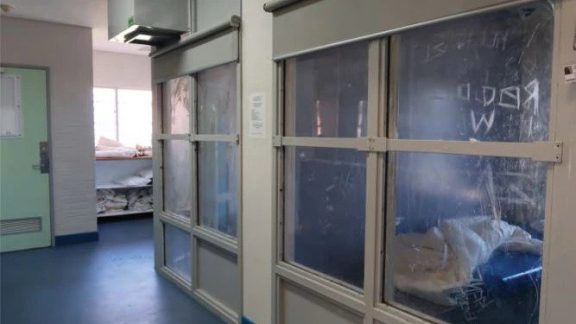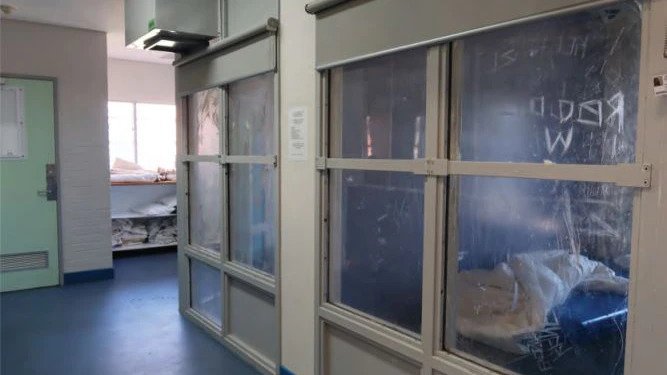
A Reflection on a Visit to Banksia Hill and Unit 18
31 August 2022
A week ago yesterday, my staff and I were taken on a tour of Banksia Hill Detention Centre and the newly-gazetted child detention facility, Unit 18, at the adult maximum-security Causarina Prison.
I have been highly critical of the conditions at both facilities and WA’s youth justice system more broadly. Too often politicians are quick to speak on issues without actually doing the work to listen to or visit with communities that are impacted by these issues, so I felt it was important for me to accept this invitation from the Department and have a look for myself.
Given everything that I’ve learned about WA’s youth detention system from stakeholders and through Parliamentary Questions, I prepared myself to be shocked. But this experience was nothing short of gut wrenching.
Here are some reflections I wrote after our visit


It was the starkness of the cells that stuck me.
A small room grimly covered in graffiti. A dirty plastic mattress, a toilet without a lid and a tiny shower over the top of it. Nothing personal or warm. Nothing to hint that this was a place built for a child. Nothing to encourage rehabilitation.
Visiting a children’s prison redefined the meaning of bleak. Standing inside that cell for only a few minutes made me want to run. I can only imagine how it must feel for a highly traumatized child to be locked in there for what must feel like an endless amount of time.
As we were informed by our tour guides, this is the place where, on a good day, children at Banksia Hill have to spend a minimum of 13 hours locked inside. On a bad day, kids could spend nearly all 24 hours of their day in this cell.
Banksia is a sprawling campus built in 1987 and it shows. The buildings and its infrastructure are tired and, as we were told again and again, large parts of it are not fit for purpose. However, I question whether a prison or criminal response for deeply traumatized children with cognitive disabilities is ever “fit for purpose.”
There are massive security fences the kids have learned to jump and run along the top of, resulting in regular prison-wide lockdowns. Most of the cells were in ruin. The need for new investment was apparent to not only keep workers, visitors, and the kids safe, but also provide genuine trauma-informed education and rehabilitation.
Disturbingly, these works seem to be haphazardly planned with a serious lack of urgency. Despite being told that some of these works are what will enable the young children transferred to Unit 18 to come back to Banksia, they are not intended to be fully completed until 2025/26. In the meantime, kids are being indefinitely held at a maximum-security adult prison with no clear timeline on when they will return.
Banksia was bad, but Unit 18 was worse. It felt like the guards outnumbered the kids 4 to 1, including the Special Operations Group who are dressed in full riot gear. We were in Unit 18 for no more than 20 minutes, but in that time there were three critical incidents that involved kids being restrained and locked down. It was truly horrifying.
During one of the incidents we were instructed to seek refuge in the prison staff room. There we saw another 8 or so education, mental health, Aboriginal Support Officers, and other support workers already in the room who were unable to do their work during lockdowns.
I have known that WA’s youth detention system is broken for some time, but this visit demonstrated just how drastically the State Government has failed these children. Many of the prison and support staff were doing their best with the facilities and resources they have been given, but the youth justice system is lurching from crisis to crisis with no real meaningful end reforms in sight.
The way we treat children who come into contact with the justice system is fundamentally broken. By the time they reach prison, we have already failed them.
Successive WA State Governments have ignored the best pediatric and mental health evidence on kids who commit offending behaviour, leaving WA in this current situation that sees a punitive and criminal response to what is very clearly a problem that stems from desperately under-funded health, mental health, education, and housing systems.
I’m not claiming to have all the answers. But as someone who has no formal training in youth justice whatsoever, it was clear to me that what WA is currently doing with kids at Banksia and Unit 18 is miserably failing.
As even the tour guides acknowledged, these problems and the opportunities for intervention start long before these kids end up in prison. Nearly all of the children at Banksia Hill have a severe neurological condition. Most of these kids are coming from traumatic backgrounds where they’ve had little continuity in housing, education, or access to health and mental health care.
Instead of continuing with criminal responses to these kids, the State Government should be investing in what we know are these basic human needs essential for healthy development.
We also need to invest in drastically reforming Banksia to a trauma-informed model of care right now. It is not acceptable that kids are transferred to a maximum-security adult facility – as terrifying and bleak as you would expect – because the Banksia is not up to scratch. These kids should not be pushed to the wayside as the “too-hard” cohort that the State Government keeps charactarising them as. They deserve continued access to the health, mental health, education, and housing services they so desperately need to give them the opportunity to thrive.
When we left Unit 18, the Commissioner turned to us and asked us for solutions. He told us that he was open to new ideas, but he was working within the constraints of their reality. Other than restating the need for more investment early in their lives and investing in upgrading Banksia with greater urgency, I was overwhelmed and didn’t really know what to say at the time.
A couple days later the Aboriginal Legal Service of WA Limited, who represents several of the children detained at Banksia and Unit 18, won a legal challenge in the Supreme Court against the Department of Justice’s use of rolling lockdowns in children’s detention. After the ruling, they released a very practical list of recommendations of where WA can start:
The WA Labor Government should be taking these recommendations seriously by adequately funding and urgently implementing these changes.
I want the thank the Commissioner and prison staff for facilitating this tour and acknowledge the work that many staff do in extremely difficult circumstances in the constraints of a system that is clearly stretched to a breaking point. There needs to be serious investment and change to fix this and we will keep pushing in Parliament for this.



Waht about some comments from the guards – how about presenting BOTH sides of the story.
Some of these “kids” have known nothing but violence and need to be dealt with firmly.
Mitch, i think the harsh treatment in only making thing worse
There are many people in Perth who want to help this situation – what is our best avenue for helping these kids?
Teresa, please contact your local and let them now how you feel, write to the Minister, and write to the local paper.
We need to shine a light on this issue.
thanks heaps
Brad